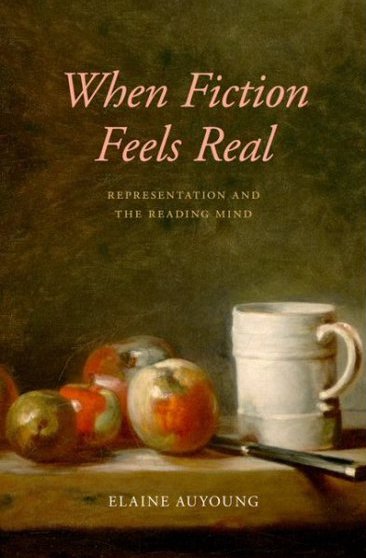Collations: Book Forum on Elaine Auyoung’s When Fiction Feels Real: Representation and the Reading Mind
 The V21 Collations: Book Forum welcomes Katarzyna Bartoszynska, Carolyn Dever and Milan Terlunen in conversation about Elaine Auyoung’s When Fiction Feels Real: Representation and the Reading Mind (Oxford, 2018). Auyoung’s provocative and compelling new work of scholarship begins with this question: “how can nineteenth-century novels bring readers into intimate relation with fictional personas and world that seem distinct from the text itself?” There is the physical reality of the text and the distinct fictional reality that comes all-the-more alive for readers both in their experience of reading and in recollecting what they read. In the latter case, and in contradistinction to conventional literary critical approaches, that recollection is all the more lively and persistent because it is not dependent on a full memory of the text’s language. While literary criticism tends to view that kind of readerly recollection as sophomorically un-critical, Auyoung seeks to develop a fuller analytical vocabulary and conceptual framework for thinking “about effects that are central to literary experience but remain on the periphery of literary studies.”
The V21 Collations: Book Forum welcomes Katarzyna Bartoszynska, Carolyn Dever and Milan Terlunen in conversation about Elaine Auyoung’s When Fiction Feels Real: Representation and the Reading Mind (Oxford, 2018). Auyoung’s provocative and compelling new work of scholarship begins with this question: “how can nineteenth-century novels bring readers into intimate relation with fictional personas and world that seem distinct from the text itself?” There is the physical reality of the text and the distinct fictional reality that comes all-the-more alive for readers both in their experience of reading and in recollecting what they read. In the latter case, and in contradistinction to conventional literary critical approaches, that recollection is all the more lively and persistent because it is not dependent on a full memory of the text’s language. While literary criticism tends to view that kind of readerly recollection as sophomorically un-critical, Auyoung seeks to develop a fuller analytical vocabulary and conceptual framework for thinking “about effects that are central to literary experience but remain on the periphery of literary studies.”
In a unique approach to presentism, Auyoung develops a critical vocabulary for thinking about how “nineteenth-century texts invite readers [then and now] to feel as though they have come to know unreal persons, places, and incidents in unexpectedly intimate and durable ways.” She is curious about the reading processes by which fictional texts remain persistent in their effects, coming to life over and over again for their readers in the past and present. She does this through a strategically interdisciplinary approach that weaves a deep knowledge of literary texts, history and theory together with an equally meaningful and thorough engagement with cognitive psychology and the history of science. The result is an exciting “new form of critical attention, approaching the words of a literary text not as bearers of interpretive meaning but as cues that prompt readers to retrieve their existing embodied knowledge to rely on their social intelligence, and to exercise their capacities for learning”—a presentist criticism that is as inclusive as it is rigorous.
| Reflection by Milan Terlunen | Reflection by Katarzyna Bartoszynska | Reflection by Carolyn Dever |
Maeve Adams, Convener and Co-Editor
Justin Raden, Co-Editor
There are no comments yet.